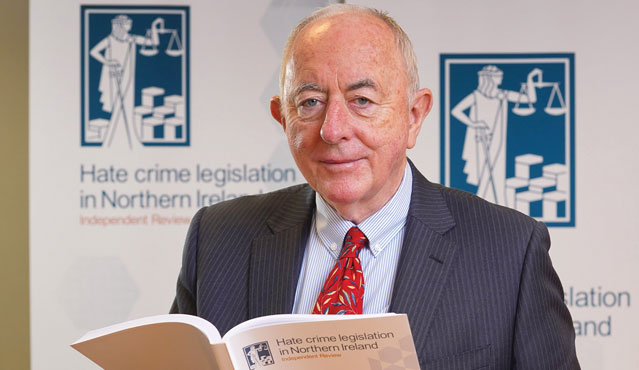Hate Crime and Public Order (Northern Ireland) Bill not expected until 2022

Northern Ireland could jump from being a laggard to having the most progressive hate crime laws in the UK, if recommendations from an independent review are accepted in the form of a proposed Hate Crime and Public Order (Northern Ireland) Bill.
However, moves to bring forward the recommendations will likely not take place until late 2022 because of the volume of legislation already being progressed by the Department.
A spokesperson for the Department of Justice confirmed that, following receipt of the recommendations in December 2020, officials in the Department are working to develop a departmental response and set out an implementation plan, expected to be considered by the Justice Minister in early 2021.
The Department has highlighted that a majority of the recommendations relate to legislative changes and will need further consideration. Asked about a proposed timeline for potentially bringing legislation forward to the Assembly, a spokesperson added: “Any legislative changes will need to be scheduled into the Department’s legislation programme in due course. Given that the legislative programme for this mandate is already full and, given the need to further develop and scope any legislative changes, this is likely to happen early in the next mandate of the Assembly.”
The final report into hate crime legislation in Northern Independent Review was published by the Department of Justice in December 2020 and includes a recommendation that age and gender (rather than misogyny) be covered as protected characteristics.
Adoption of the recommendation would see Northern Ireland align closely with the Scottish model of hate crime law but also become the first of any of the UK jurisdictions to include gender under hate crime legislation.
Justice Minister Naomi Long has asked for time to give the “complex and wide-ranging” recommendations “careful consideration”.
The report includes 34 recommendations, including a suggested definition of a hate crime for Northern Ireland, in the absence of a clear and universally accepted definition in law.
Distinguishing between hate speech (criminal expressions of bigotry) and hate crime (the commission of criminal offences with a bias motive (hate crime), Judge Desmond Marrinan, the man tasked with the review by the Department of Justice in June 2019, recommends that: “A hate crime may be defined as a criminal act perpetrated against individuals or communities with protected characteristics based on the perpetrator’s hostility, bias, prejudice, bigotry or contempt against the actual or perceived status of the victim or victims.”
The backdrop for the review was a commitment from then Justice Minister Claire Sugden MLA to initiate the process in 2017, following calls from numerous corners for hate crime legislation in Northern Ireland to be reviewed on recognition that Northern Ireland reports a hate crime ratio in excess of England and Wales.
An average of eight hate incidents are reported in Northern Ireland every day and in recent years racist hate incidents have outnumbered sectarian hate incidents. Between 2016 and 2018/19, 1,124 racist hate-motivated incidents were recorded compared to 865 sectarian hate motivated incidents for the same period.
In 2018/19, racist hate abuse in Northern Ireland accounted for almost half of all reported occurrences with hate motivation, while sectarian abuse accounted for just over one-third. However, the extent of the problem is emphasised when considering the smaller proportion of the population from a black or multi-ethnic background in Northern Ireland. The review found that there is roughly a one in 31 chance of being a victim of a reported racial hate incident in Northern Ireland compared to an approximately one in 1,777 chance of being a victim of a reported sectarian hate incident.
Currently no specific offence of ‘hate crime’ exists in Northern Ireland law. Instead, provision for hate crime in Northern Ireland centres exclusively on the enhanced sentencing provisions of the 2004 Order. In 2019, not one single defendant brought before the crown court on allegations of hate crimes received an enhanced sentence above the expected penalty for their crime.
Sixteen years on from the introduction of enhanced sentencing provision for hate crime incidents, Judge Marrinan says: “Nothing I have read or reviewed since the launch of the consultation paper in January 2020 has given me any assurance that this enhanced sentencing law is working any better now or is capable of being reformed.”
His recommendation, therefore, is for the Department of Justice to legislate to copy the Scottish model and add statutory aggravations to all existing offences, meaning that any criminal offence could be charged in its aggravated form.
The proposed expansion of categories of protected characteristics by the review would see Northern Ireland join England, Scotland and Wales in including transgender as a protected characteristic and go further to include all crimes with a gender-based motive. Additionally, the review recommends adding age as a protected characteristic, however, it opts not to suggest an elder specific protection. Interestingly, Marrinan suggests leaving the door open in legislation for other protected characteristics to be added to the list if evidence emerges that this is necessary.
“A hate crime may be defined as a criminal act perpetrated against individuals or communities with protected characteristics based on the perpetrator’s hostility, bias, prejudice, bigotry or contempt against the actual or perceived status of the victim or victims.”
— Hate crime definition recommendation
On sectarianism, the report suggests the requirement for a more precise legal meaning for the term and believes that sectarianism “should be specifically defined as an issue that exists between Christian communities in Northern Ireland” at this time, adding the belief that not enough is understood about sectarianism in relation to other communities in Northern Ireland to make the application of sectarianism to those communities meaningful in a legal or social sense. In essence, the report recommends the application of the findings of the report of the working group on defining sectarianism in Scots law in 2018 to Northern Ireland.
In a series of other wide-ranging recommendations, the report also suggests changes to that would have bearing on freedom of expression and the regulation of hate expression in public spaces, where a clear and unambiguous statutory duty on relevant public authorities is recommended to take all reasonable steps to remove hate expression from their own property and, where it engages their functions, broader public space.
Additionally, the review had included in its remit the role of restorative justice in dealing with hate-motivated offending and has established the need for a new statutory scheme for restorative justice for over-18s, similar to the existing Youth Justice Agency in Northern Ireland. This, the report recommends, should be supported by the established of a funded framework and that the scheme remain independent of the Department of Justice.
Addressing online hate crime was also a focus for recommendations. As well as calls for the UK’s Online Harms White Paper (2019) to be implemented in full, and for stricter rules on jurisdiction, enhanced access to prosecution guidelines, and an alteration of Northern Ireland’s Malicious Communications (Northern Ireland) Order 1988 to change the use of publication to refer to posting or uploaded material.
Article 3 of the Malicious Communications (Northern Ireland) Order 1988 should be amended to explicitly bring within its ambit electronic communications, the report says. The word ‘publication’ should be amended to refer to ‘posting’ or ‘uploading material online’.
Concluding with a recommendation that all hate crime and hate speech law should be consolidated into a new Hate Crime and Public Order (Northern Ireland) Bill, Judge Marrinan’s recommendations also assesses the potential oversight of change. Outlining his belief that the issues “fully justify” a dedicated post, Marrinan recommends an office of a Hate Crime Commissioner for Northern Ireland should be established and suggests the potential for a joint shared post of Hate Crime and Domestic Abuse Commissioner.
“I believe this would work well because the remit for this post relates to specific criminal contexts which are not dissimilar,” he adds.





